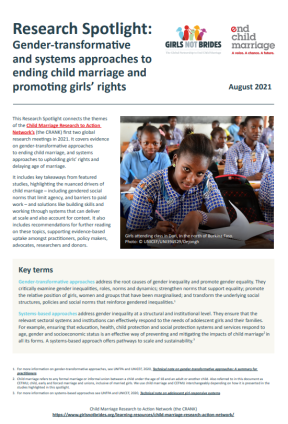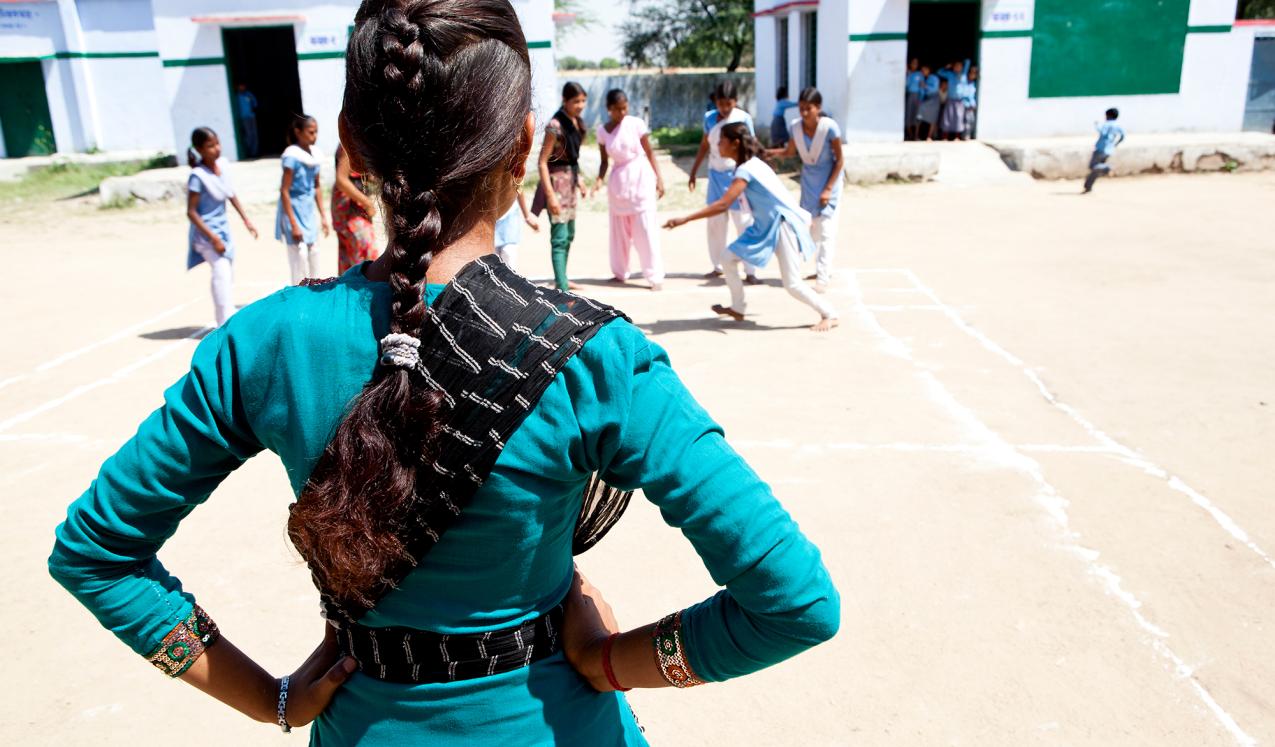
- Case study
- 20 Agosto 2019
Understanding and overcoming backlash against girls’ expression of agency: Insights and strategies from India
- Author: Shruti Parikh, Saniya Pawar
With 253 million adolescents, India has the largest adolescent population on our planet. This group, which is bigger than the entire population of Brazil in its scale, is destined to become the productive force of this vast nation. If properly invested in, this group also has the ability to influence cross-generational change and change the socioeconomic course of India. Yet many adolescents suffer from systemic vulnerabilities that are deeply rooted in harmful gender norms that hinder them reaching their full potential. Attempts to challenge these norms are often resisted with violence, restrictions, and other forms of ‘backlash’. This case study presents findings from our inquiry into the topic, ‘Action/Reaction’, which draws on the experiences of 73 adolescent-focused organizations to better understand the nature and extent of backlash against empowered girls and organizations that aim to support their empowerment.
Background
India holds one of the worst track records across the developing world for the health, safety and education of adolescent girls. Every year, as a result of a high prevalence of deep-rooted and harmful gender norms, over 60 million girls do not complete secondary education and 16 million become pregnant. Harmful norms are widely accepted: India’s National Family Health Survey (2016) found that 47% women felt it was justified for their husbands to beat them and 69% young women and girls indicated that they felt unsafe commuting alone at night.
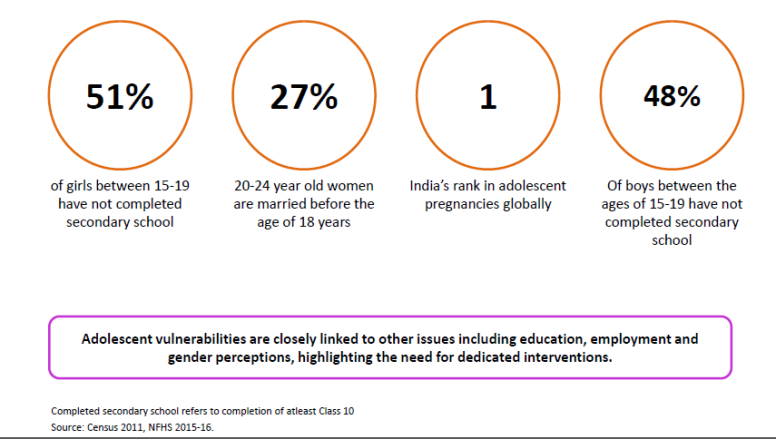
In 2017, the 10to19: Dasra Adolescents Collaborative (DAC) was launched to address such challenges. This national initiative unites funders, non-profits, technical experts and the government to transform the lives of over five million adolescents across four target outcomes: delaying the age of first marriage, delaying the age of first pregnancy, increasing adolescent agency, and increasing the proportion of adolescents completing their secondary education.

DAC supports implementation of comprehensive and scalable programmes to address all four outcomes at the state level in Jharkhand.
At national level, it brings together a trust-based network, the ‘Community of Practice, of 140+ adolescent-focused non-profits from across India to host consultations on the priorities and challenges of working adolescents. This ‘Community’ aims to shift mind-sets to look beyond the challenges facing the individual adolescent girl to explore and address underlying issues in the system and communities that surround her.
The community has found that backlash is a common experience faced by adolescent girls for expressing agency or attitudes that differ from traditional gender norms, as well as by community leaders and non-profit organizations working to deliver social and behaviour change.
We define backlash as a reaction from those who hold positions of power to attempts to change the status quo by those who are less powerful (usually in the form of punishment). Such punishment may range from ridicule, stigmatization or verbal abuse, to more serious consequences such as forced withdrawal from school, forced marriage, forced seclusion within the home, and even to life-threatening punishments such as beatings, physical abuse, rape or other forms of violence.
Despite reports of widespread experience of backlash, our consultations found that:
- There have been few attempts to understand backlash in a systematic way
- There is little evidence on how backlash affects girls who try to exercise their own agency.
To bridge this gap, DAC carried out an exploratory study involving 73 organizations from the Community of Practice.
Key findings
Findings from this study suggest that as many as 85% of responding organisations were familiar with at least one incident of backlash against girls who displayed agency or defied traditional gender norms:
- 51% all responding organisations described incidents in which a girl was refused permission to participate in outdoor sports for fear of adverse reactions from the community
- 60% of organisations reported that they were aware of a girl whose parents had denied her permission to continue attending their programmes because they were afraid that she would exercise agency (or had already done so)
- 50% of the responding organisations were familiar with girls who faced violence, denial of food, or forced seclusion when they expressed agency, such as trying to negotiate their own career aspirations, accessing livelihood training programmes or refusing to marry against their will.
Participating organisations also reported instances of backlash faced by boys – often in the form of ridicule – when they expressed gender egalitarian attitudes or behaviours that defied traditional norms, such as performing household chores.
We also found that over 60% of organisations that were implementing programmes to empower girls (through building leadership and livelihood skills, providing sexual and reproductive health information, encouraging completion of education, or helping delay marriage) reported experiences of backlash:
- 30% of the responding organisations were forced to modify programme content (for instance dropping modules on sensitive topics such as sexual health or child marriage) because of negative reactions from community members
- 50% of the responding organisations were denied entry into communities, or had their field-level programme implementers threatened, verbally abused and even physically attacked.
Recommendations

- Engage parents, communities and government authorities: Reaching out to the entire range of stakeholders at the family, community and institutional levels plays an important role in preventing backlash. And creating supportive networks in communities by involving women’s groups, local elected representatives or religious leaders among others has also helped in not only avoiding backlash but also managing it when it occurs.
- Make good use of champions and positive role models: The presence of adolescent and parental role models in communities helps to alleviate fears about deviating from social norms, especially in the eyes of parents of girls. They can demonstrate that delaying marriage, achieving higher education or making their own life choices have not hurt their family’s reputation, but have instead helped them.
To find out more read the "Action Reaction" report listed below or email [email protected].
- Tags:
- Adolescence, Theory, Education
- Countries / Regions:
- India
Related resources
Report
1 Marzo 2019
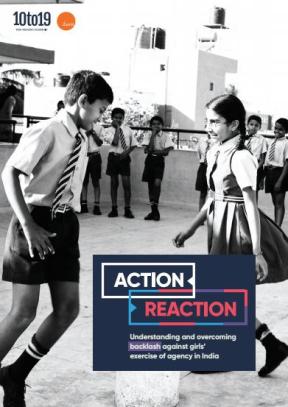
Journal article
24 Agosto 2022
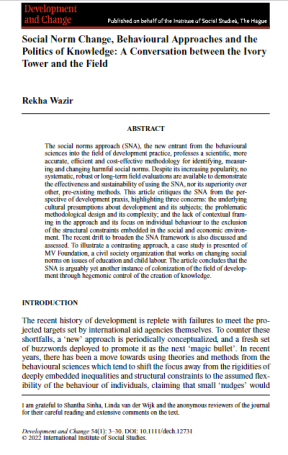
Briefing paper
1 Agosto 2021
